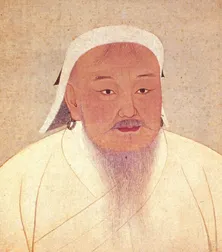Genghis Khan’s Legacy?
The Mongol warlord may have left his imprint on the world's DNA
Some 800 years ago, a fearsome, charismatic warrior named Temujin united the nomadic tribes of Mongolia. In 1206, he assumed the title Genghis Khan, often translated as emperor of emperors, and started invading surrounding territories. Massacring many of the people that he conquered, so as to leave no enemies and to strike fear in would-be foes, Genghis Khan ultimately controlled a massive empire ranging from today’s Afghanistan across China. His male descendants continued the dynasty for many generations.


It appears that Genghis Khan left a mark on more than history: His influence may persist in the DNA of men today. According to an international team of geneticists, about 1 in 12 men in Asia–and therefore 1 in 200 men worldwide–carry a form of the Y chromosome that originated in Mongolia nearly 1,000 years ago. Today’s unusual prevalence of this chromosomal variant is most likely the result of Genghis Khan’s military success, the investigators say. Even more provocatively, the researchers suggest that Genghis Khan himself had this particular version of the Y.
Unlike other chromosomes, the Y exchanges little DNA with its partner, the X chromosome, when the sperm’s DNA joins with the egg’s. As a result, the Y chromosome retains a largely undisturbed record of mutations.
Using some 30 natural genetic markers, Chris Tyler-Smith of the University of Oxford in England and his colleagues classified the Y chromosomes of more than 2,100 men from locations across Asia. The markers included DNA deletions and insertions, as well as more subtle changes in the Y’s DNA sequence. Other crucial markers were so-called microsatellites, regions of repetitive DNA that can expand or shrink from one generation to the next.
The scientists expected each man to show a unique combination of the DNA markers, and most did. However, they found that about 8 percent of the men carry Y chromosomes with identical or nearly identical markers, signifying a related ancestry, the researchers report in the March American Journal of Human Genetics. This minority lives in 16 different populations spanning a region of Asia from the Aral Sea in the west to the Yellow Sea in the east. “Finding one closely related group of lineages that is so widespread and at such high frequency is absolutely amazing,” says Tyler-Smith.
Using estimates of the mutation rate of microsatellite DNA, the investigators conclude that the first man to have this particular form of the Y chromosome lived in Mongolia roughly 1,000 years ago. They argue that chance alone can’t account for its modern dispersal and prevalence. Nor do they think that natural selection favoring certain gene variants explains the chromosome’s rapid rise to prominence.
All the data point to Genghis Khan, according to Tyler-Smith. If this version of the Y chromosome was present in a significant percentage of his army, it could quickly have increased its distribution as the Mongols expanded their empire. Genghis Khan’s habit of slaying people he conquered, especially males, would have helped this form of the Y chromosome displace others. It’s even possible that just Genghis Khan and his sons may have had enough offspring to account for the chromosome’s unusually high prevalence today, says Tyler-Smith.
Y debate
Other geneticists are divided on how to react to the idea that Genghis Khan himself was central to the spread of a particular Y chromosome.
“It’s a bit melodramatic,” says Peter Underhill of Stanford University. The Y chromosome data are “consistent with a recent Mongolian expansion. That’s fine,” says Underhill. “It’s a question of if you want to imply that this is Genghis Khan’s Y chromosome and that he left all these living descendants. It’s hard to prove that.”
“The problem is to be sure that this is the personal Y chromosome of Genghis Khan,” adds Jaume Bertranpetit of the University of Pompeu Fabra in Barcelona. “Nonetheless, it is more likely that it is his Y than anyone else’s in his time. He had the cultural fitness to spread his genes.”
At least one scientific journal rejected the new report for publication because of its emphasis on Genghis Khan, acknowledges Tyler-Smith. “There’s a reluctance to link genetic findings to historical individuals.
The investigators say they have indirect evidence that Genghis Khan carried the Y chromosome variant that caught their eye. Although few men in Pakistan have this specific Y chromosome, about a third of a group of Pakistani men known as the Hazara have it or a closely related one. The Hazara are of Mongolian origin, and oral histories hold that they’re direct descendants of Genghis Khan.
Archaeologists have recently begun excavating a site in Mongolia that might hold Genghis Khan’s tomb. Noting that geneticists have analyzed DNA from Neanderthal skeletons, Tyler-Smith suggests that the tomb’s discovery could lead to a direct comparison of Genghis Khan’s Y chromosome with those of modern men.
****************
If you have a comment on this article that you would like considered for publication in Science News, please send it to editors@sciencenews.org.